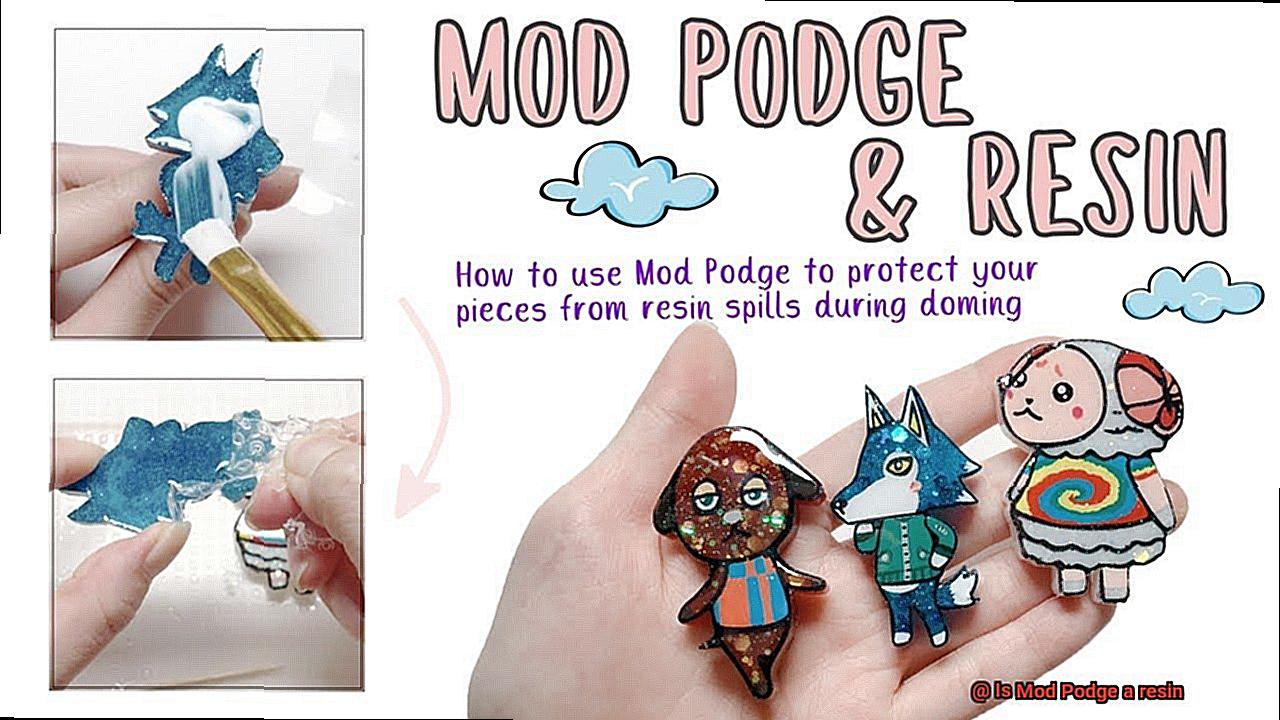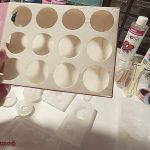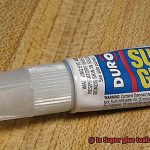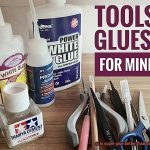Are you a crafty soul always on the lookout for new materials and techniques to elevate your DIY game? If so, you’ve probably stumbled upon the magical world of Mod Podge. This versatile glue has won hearts with its unmatched ability to bond, seal, and finish countless projects. But here’s the thing – there’s been some confusion swirling around whether Mod Podge can truly be called a resin.
In this blog post, we’re diving headfirst into the depths of Mod Podge’s composition to uncover its true identity.
We’ll also compare it to other popular resins so you can finally put those nagging doubts to rest. So grab your glue gun and get ready for an enlightening journey as we unravel the enigma that is Mod Podge’s resin status.
What is Mod Podge?
Contents
- 1 What is Mod Podge?
- 2 What is a Resin?
- 3 Similarities Between Mod Podge and Resins
- 4 Differences Between Mod Podge and Resins
- 5 Chemical Composition of Mod Podge vs Resin
- 6 Application of Mod Podge vs Resin
- 7 Advantages of Using Mod Podge Over Resin
- 8 Disadvantages of Using Mod Podge Over Resin
- 9 Conclusion
Mod Podge, the magical crafting elixir, is a versatile wonder that serves as both a glue and a sealer. Created in the 1960s by the brilliant Jan Wetstone, Mod Podge was designed to revolutionize the decoupage process and simplify the lives of craft enthusiasts everywhere. Made from a delightful concoction of polyvinyl acetate (PVA) glue and water, Mod Podge possesses adhesive properties that effortlessly bond different materials together.
One of the key enchantments of Mod Podge lies in its sealant function. When this enchanting substance is applied to a surface, it dries clear and forms a protective layer that shields and preserves artwork or craft projects. This makes it an absolute essential for decoupage projects where delicate paper or lavish fabric is lovingly applied to surfaces like wood, glass, or ceramics.
But wait. There’s more. Mod Podge comes in an array of formulas and finishes to cater to every craft lover’s desires. The matte finish bestows a subtle understated elegance, while the gloss finish grants a dazzling surface that gleams with brilliance. For those seeking a touch of refined sophistication, the satin finish offers a gentle sheen. And for the brave souls who dare to venture into the great outdoors with their crafts, there is even an outdoor formula that fearlessly withstands exposure to the elements.
However, let us not be deceived. While Mod Podge shares some similarities with resins, such as providing a glossy finish, it possesses its own unique magic. Unlike resins made from synthetic materials like epoxy or polyester that undergo a chemical reaction during curing, Mod Podge simply evaporates its water content when it dries. It is this mystical evaporation that allows Mod Podge to maintain its ethereal qualities.
What is a Resin?
Resin is a fascinating substance that has a wide range of applications and uses. Let’s take a closer look at what resin is and how it is used in various industries.
Definition and Origins:
Resin is a solid or semi-solid substance that is derived from organic materials, particularly plants. It is typically viscous and hardens when exposed to specific conditions such as heat, pressure, or chemical reactions. Resins can be natural or synthetic, each with its own unique properties and characteristics.
Natural Resins:
Natural resins are obtained from plant sources, such as trees and shrubs. Examples of natural resins include amber, rosin, and shellac. These resins have been used for centuries for various purposes, ranging from making varnishes and paints to producing jewelry and incense. Natural resins are often extracted by tapping the plant or through other extraction methods.
Synthetic Resins:
On the other hand, synthetic resins are man-made materials created through chemical processes. They are often derived from petrochemicals or other organic compounds. Synthetic resins are designed to mimic the properties of natural resins while offering additional benefits such as improved strength, resistance to chemicals and weathering, and better control over properties like viscosity and curing time.
Epoxy Resin:
One common type of synthetic resin is epoxy resin. It is a two-component system consisting of a resin and a hardener. When these two components are mixed together, a chemical reaction occurs, resulting in a solid and durable material. Epoxy resin is known for its high strength, excellent adhesion properties, and resistance to heat and chemicals. It finds wide application in construction, automotive, electronics, and arts and crafts industries.
Artistic Applications:
Resin has gained popularity in the arts and crafts world as a medium for creating unique and beautiful pieces. Resin art involves pouring or casting resin onto a surface and allowing it to cure, resulting in a glossy and durable finish. Resin can be combined with various pigments, dyes, and additives to create stunning effects such as cells, lacing, and geode-like formations. It is also used in the production of jewelry to create clear and protective coatings that enhance the beauty and longevity of the pieces.
Similarities Between Mod Podge and Resins
First and foremost, both Mod Podge and resins possess adhesive properties that allow them to bond different materials together. Whether you’re working with wood, paper, fabric, or other materials, both Mod Podge and resins can create strong bonds that hold everything in place. This makes them ideal for various craft projects and DIY endeavors.
In addition to their adhesive properties, Mod Podge and resins can also be used as sealants. They provide a protective coating over surfaces or artwork, helping to preserve them and protect them from damage. Whether you’re sealing a piece of artwork or adding a protective layer to a tabletop or piece of furniture, both Mod Podge and resins offer options for creating a durable and long-lasting finish.
Another similarity between Mod Podge and resins is the availability of different formulations. Both products come in various formulations that cater to different project requirements. Whether you’re looking for a glossy finish or a matte one, there are options available for achieving the desired result. This versatility allows users to experiment and explore different effects and finishes in their craft projects.
Furthermore, both Mod Podge and resins can be used for decoupage. Decoupage is a popular technique where decorative paper or cutouts are adhered onto surfaces to create unique designs. Mod Podge is commonly used for this purpose, but certain types of resins can also be used to achieve similar effects.
Moreover, both Mod Podge and resins offer a clear drying finish. This makes them suitable for preserving or displaying artwork or other crafts without altering the original appearance. The clear finish allows the beauty of the materials to shine through while providing a protective barrier against moisture, UV rays, and general wear and tear.
Lastly, both Mod Podge and resins can be sanded and polished to achieve a smooth surface if desired. This makes them versatile materials that can be used to create professional-looking finishes.
Differences Between Mod Podge and Resins
Mod Podge and resins may share some similarities in their adhesive and protective properties, but they have distinct differences that make them suited for different tasks. Here are the key differences between Mod Podge and resins:
- Consistency: Mod Podge boasts a thicker consistency, making it a breeze to work with when adhering materials. Resins, on the other hand, flow like liquid silk, allowing them to effortlessly level out on surfaces.
- Drying Time: Mod Podge can dry within a mere 15-30 minutes, depending on the thickness of the application. Resins, however, take their time to cure and harden, often requiring several hours or even days.
- Finish: Mod Podge is known for creating a matte or satin finish that adds a protective layer without a high-gloss appearance. Resins, on the other hand, bestow a smooth, shiny finish that enhances the colors and patterns of the underlying materials.
- Durability: When it comes to durability, resins are the heavyweight champions. With their scratch-resistant properties and ability to withstand heavy use, they outshine Mod Podge in terms of wear and tear resistance. While Mod Podge offers some level of protection, it may not hold up as well under intense use or exposure to moisture.
- Application Process: Applying Mod Podge is as simple as using a brush or sponge, with excess easily wiped away. Resins, however, require a more meticulous approach. Mixing them precisely and applying them carefully is crucial to avoid pesky bubbles or uneven coverage. Multiple coats are often necessary for optimal results.
- Cost: Mod Podge takes home the prize in affordability. It’s readily available in craft stores at a lower cost compared to resins. The latter can be pricier, especially high-quality ones that may require additional tools or equipment for proper application.
Chemical Composition of Mod Podge vs Resin
Mod Podge and resin are two commonly used materials in various craft projects, but they have distinct differences in terms of chemical composition and properties.
Mod Podge is primarily composed of water, polyvinyl acetate (PVA) or white glue, and various additives like thickeners and preservatives. PVA is a synthetic polymer that forms a flexible film when it dries. This adhesive property makes Mod Podge ideal for woodworking, paper crafting, and other crafts where bonding different materials together is required.
Resins, on the other hand, consist of a base resin and a hardener. The base resin can be epoxy, polyester, or polyurethane, while the hardener acts as a catalyst for the curing process. When these components are mixed together, a chemical reaction occurs, resulting in a hard and durable material.
Here are some key differences between Mod Podge and resin:
- Composition: Mod Podge contains water, PVA glue, and additives, while resins consist of base resins and hardeners.
- Drying/Curing Time: Mod Podge dries quickly within minutes, while resins require several hours or even days to fully cure.
- Finish: Mod Podge creates a protective layer with a matte or satin appearance, while resins provide a glossy sheen that enhances colors and patterns.
- Durability: Resins are more durable than Mod Podge and offer better scratch resistance. They can withstand heavy use and exposure to moisture.
- Application: Mod Podge can be applied with a brush or sponge, while resins require more meticulous application to avoid bubbles or uneven coverage.
- Cost: Mod Podge is generally more affordable than resins, which can be pricier and may require additional tools for proper application.

Application of Mod Podge vs Resin
When it comes to application, Mod Podge and resin have some distinct differences that make them suitable for different crafting projects. Let’s dive into the details:
- Mixing and preparation: Mod Podge is a convenient option as it is ready to use straight from the bottle. No need for precise measuring or mixing. On the other hand, resin requires careful measuring and mixing of its two parts (resin and hardener) in specific ratios. This ensures proper curing and hardening.
- Application tools: Mod Podge can be easily applied with a brush or sponge applicator, making it versatile for both small and large areas. Resin, however, is typically poured onto a surface using a mixing cup and then spread with a brush or spreader tool. It can also be used with molds to create specific shapes or designs.
- Layering: Mod Podge is best applied in thin layers, allowing each layer to dry completely before adding another. This prevents bubbling or wrinkling of the paper or fabric being adhered. In contrast, resin is often poured in a thicker layer that self-levels and spreads out evenly on its own.
Now, let’s talk about drying time and durability:
- Mod Podge dries relatively quickly, usually within 15-20 minutes (depending on layer thickness), making it great for projects with tight deadlines. However, it takes around 24 hours to fully cure and reach maximum hardness.
- Resin has a longer drying time, typically several hours to dry to the touch. It may take up to 24-48 hours or even longer to fully cure and harden. Patience is key here.
In terms of durability, Mod Podge creates a water-resistant and slightly durable finish that can withstand light use and gentle cleaning. However, it may not hold up well to heavy wear and tear or exposure to moisture over time.
Resin, on the other hand, forms a hard and glossy surface that is resistant to scratches, heat, moisture, and UV rays. Once fully cured, it provides a durable finish that can withstand heavy use and cleaning.
Advantages of Using Mod Podge Over Resin
When it comes to choosing between Mod Podge and resin for crafting projects, there are several distinct advantages that make Mod Podge the preferred choice for many crafters. Let’s explore these advantages in more detail:
- Ease of Use: Mod Podge is renowned for its simplicity and ease of use. Unlike resin, which requires precise measuring and mixing ratios, Mod Podge comes in a ready-to-use form. It can be effortlessly applied with a brush or sponge, eliminating the need for any special equipment or complicated processes. This makes Mod Podge an excellent option for beginners or those seeking a hassle-free crafting experience.
- Safety: Safety is always a paramount concern when working with adhesives and sealants. Resin contains toxic chemicals that can pose harm if not handled properly. Its application requires careful ventilation and the use of protective gear like gloves and masks. In contrast, Mod Podge is non-toxic and odorless, making it a safer choice for crafters, particularly those working in small spaces or with children.
- Drying Time: Time is of the essence, especially when eager to see the final outcome of a crafting project. Mod Podge boasts a relatively quick drying time, typically ranging from 15-30 minutes to a few hours depending on the application thickness. This allows for faster project completion and reduces waiting time compared to resin, which can take several hours or even days to fully cure.
- Versatility: Mod Podge offers a wide range of finishes and variations to cater to different crafting needs. With options such as matte, gloss, satin, sparkle, and outdoor formulations available, crafters have the flexibility to achieve various desired effects. Furthermore, Mod Podge can be used on diverse surfaces including wood, paper, fabric, and even glass. In contrast, resin primarily serves as a coating and sealing agent and may not offer as many finish options.
- Cost-Effective: Budget considerations often influence material choices in crafting. Mod Podge is generally more cost-effective compared to resin. Due to its specialized nature and the need for precise mixing and curing processes, resin can be quite expensive. Mod Podge, on the other hand, is more affordable and readily available in craft stores or online. This makes it a budget-friendly option for crafters seeking a glossy, sealed finish without breaking the bank.
Disadvantages of Using Mod Podge Over Resin
Mod Podge, the beloved crafting glue and sealant, is a staple in many DIY projects. However, it’s important to acknowledge that Mod Podge does have its limitations. When compared to resin, there are several disadvantages that need to be considered:
- Durability: While Mod Podge is reliable, it falls short in terms of strength and longevity compared to resin. Resin creates a robust and enduring coating that can withstand heavy use and water damage. In contrast, Mod Podge may not provide the same level of protection.
- Yellowing: Over time, Mod Podge has a tendency to yellow or develop an amber hue, especially when exposed to sunlight or heat. This unfortunate discoloration can significantly impact the overall appearance of your project. Resin, on the other hand, remains clear and vibrant for longer periods and is more resistant to yellowing.
- Glossiness: Although Mod Podge can give your creation some shine, it may not achieve the same level of stunning gloss as resin. Resin possesses a natural ability to produce a smooth and glossy finish, making it perfect for projects that demand a shiny and polished appearance.
- Waterproofing: Mod Podge offers some resistance to water but falls short when it comes to complete protection against moisture or liquids. Resin, however, forms a watertight seal that shields surfaces from water damage or spills.
- Rigidity: For projects requiring a rigid or hard surface, Mod Podge may not be the best choice. Even after drying, it retains some flexibility which may not be ideal for jewelry making or creating durable tabletops. Resin, in contrast, cures into a solid and hard finish.
m21RbxN-69A” >
Conclusion
To sum it up, Mod Podge is the ultimate crafting glue and sealant that DIY enthusiasts swear by. While it may share some similarities with resins, like its adhesive properties and ability to create a glossy finish, Mod Podge boasts its own unique qualities that make it stand out from the crowd.
Made from a combination of polyvinyl acetate (PVA) glue and water, Mod Podge has a secret weapon up its sleeve – quick drying time. This means you can get on with your project without waiting around for ages. Plus, it’s super easy to use and won’t break the bank. Talk about a win-win.
On the flip side, resins are made from base resins and hardeners that undergo a fancy chemical reaction to cure and harden. They’re the heavy hitters when it comes to durability, scratch resistance, and waterproofing capabilities. If you need something tough as nails or expect your creation to endure heavy use or moisture exposure, resin is your go-to.
When deciding between Mod Podge and resin for your masterpiece in the making, take into account factors like desired finish, durability needs, complexity of application process, budget constraints, and safety considerations. Each material has its pros and cons depending on what you’re trying to achieve.
At the end of the day, whether you opt for Mod Podge or resin boils down to personal preference and specific project requirements.






